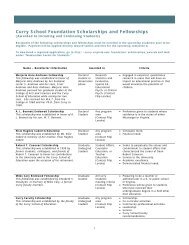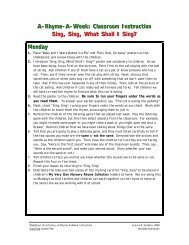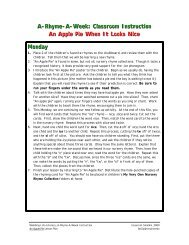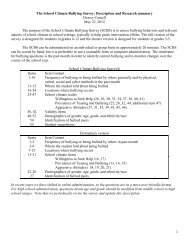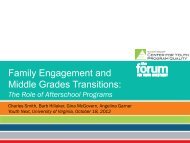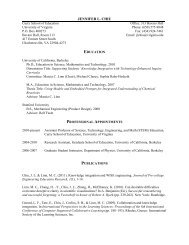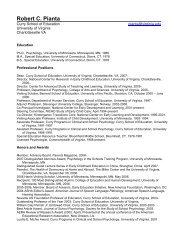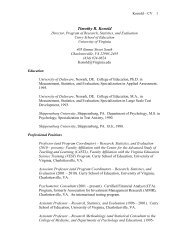2012-09-03 kinzie full vita - Curry School of Education ...
2012-09-03 kinzie full vita - Curry School of Education ...
2012-09-03 kinzie full vita - Curry School of Education ...
You also want an ePaper? Increase the reach of your titles
YUMPU automatically turns print PDFs into web optimized ePapers that Google loves.
MABLE B. KINZIE<br />
in both pre-assessment (α = .74) and post-assessment (α = .77). This measure<br />
addresses:<br />
- Scientific tools<br />
- Weather<br />
- Temperature and seasons<br />
- Material composition<br />
- Motion<br />
- Buoyancy<br />
� Pre-K Math Rating Scale<br />
We developed five items for teacher rating <strong>of</strong> children’s math performance,<br />
coupling these with seven items from the Academic Rating Scale (ARS) for<br />
Mathematics developed by the Early Childhood Longitudinal Study –<br />
Kindergarten Cohort (ECLS-K). The resulting rating scale was found to be<br />
significantly correlated with concurrent direct assessments <strong>of</strong> students’ math<br />
skills (see Kilday, Kinzie, Mashburn, & Whittaker, 2011) and to show good internal<br />
consistency in both fall (α = .85) and spring (α = .97) administrations.<br />
� Pre-K Science Rating Scale<br />
For teacher rating <strong>of</strong> children’s science performance, we developed seven items<br />
and drew three more from the Academic Rating Scale (ARS) for General<br />
Knowledge, developed by the Early Childhood Longitudinal Study – Kindergarten<br />
Cohort (ECLS-K). The resulting rating scale has shown good internal consistency<br />
in both fall (α = .82) and spring (α = .96) administrations.<br />
� Pre-K Teachers’ Pedagogical Concept Knowledge in Math and in Science (2)<br />
To identify teachers’ baseline pedagogical concept knowledge for early<br />
childhood mathematics and science, and growth in these two areas, we<br />
developed two surveys. Guiding Students’ Learning – Math was developed with<br />
Pat McGuire Robert Berry, and Carolyn Kilday, and provides ten hypothetical<br />
statements made by pre-kindergarten students; teachers identify whether the<br />
statements are true or false and when false, correct the statements. Guiding<br />
Students’ Learning – Science was developed with Edward Pan, Youngju Lee, and<br />
Jean Foss, and asks teachers to articulate how they would help pre-k students<br />
come to understand four primary concepts: Buoyancy, Differences in shape<br />
between solids and liquids, How shadows are created, and How plants get their<br />
food. Analyses <strong>of</strong> teacher responses from our 35-classroom field trial are now<br />
underway.<br />
� Teacher Attitudes about Questioning<br />
This eight-item rating scale reflects teachers’ attitudes about closed-ended and<br />
open-ended questioning. It was developed with Youngju Lee and item analysis<br />
and analyses <strong>of</strong> pre/post teacher responses are now underway.<br />
18



